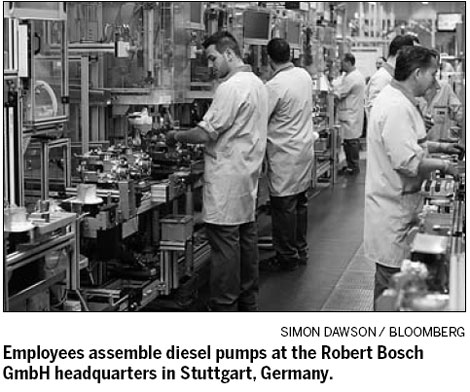Eurozone factory inflation declines
Updated: 2012-06-05 07:47
(China Daily)
|
||||||||

Eurozone producer-price inflation slowed for a seventh month in April, led by lower energy costs, as the deepening economic slump curbed price pressures.
Factory-gate prices in the 17-nation eurozone rose 2.6 percent from a year earlier, the weakest annual gain since March 2010, after rising a revised 3.5 percent in March, the European Union's statistics office in Luxembourg said on Monday. Economists had forecast an increase of 2.7 percent, the median of 18 estimates in a Bloomberg News survey showed. April producer prices were unchanged compared with March.
Crude-oil prices have retreated about 19 percent over the past two months, easing cost pressure on companies as the eurozone's economic slump worsens. With economic confidence at its lowest point in two-and-a-half years and unemployment currently at a record 11 percent, the European Central Bank may have to lower interest rates as soon as July, according to economists.
Declining oil prices are among indicators suggesting that "inflation risks are easing appreciably and the ECB has increasing scope to take interest rates lower", said Howard Archer, chief European economist at IHS Global Insight in London. "We now expect the ECB to trim interest rates in the third quarter, with July a very real possibility."
In Germany, Europe's largest economy, prices rose 2.4 percent from a year earlier, after increasing 3.4 percent in March, Monday's data showed. France, Spain and Italy all reported slowing price growth.
Energy costs on the producer level advanced 6.8 percent in April from a year earlier after rising 9 percent in the previous month, the report showed. Annual price growth of intermediate goods was 0.6 percent, down from 0.9 percent, and costs of capital goods rose 1.1 percent in the year.
Eurozone inflation at the consumer level slowed to 2.4 percent in May, the weakest since February last year, and households grew more pessimistic about their ability to save over the coming year. European unemployment reached 11 percent in March and April, the highest since eurozone records began in 1995.
The ECB, which cut its benchmark rate in the fourth quarter to 1 percent, matching a record low, will hold its next monetary assessment on Wednesday. It will also publish its latest inflation projections for this year and next.
ING Bank said in an e-mailed note on Thursday that the ECB has room to lower borrowing costs given the latest economic data.
"Lower inflation, collapsing confidence indicators and weak monetary data have once again illustrated the dire state of the eurozone economy," it said. Still, the ECB "will wait at least another month".
Bloomberg News in Zurich
(China Daily 06/05/2012 page17)

 Relief reaches isolated village
Relief reaches isolated village
 Rainfall poses new threats to quake-hit region
Rainfall poses new threats to quake-hit region
 Funerals begin for Boston bombing victims
Funerals begin for Boston bombing victims
 Quake takeaway from China's Air Force
Quake takeaway from China's Air Force
 Obama celebrates young inventors at science fair
Obama celebrates young inventors at science fair
 Earth Day marked around the world
Earth Day marked around the world
 Volunteer team helping students find sense of normalcy
Volunteer team helping students find sense of normalcy
 Ethnic groups quick to join rescue efforts
Ethnic groups quick to join rescue efforts
Most Viewed
Editor's Picks

|

|

|

|

|

|
Today's Top News
Health new priority for quake zone
Xi meets US top military officer
Japan's boats driven out of Diaoyu
China mulls online shopping legislation
Bird flu death toll rises to 22
Putin appoints new ambassador to China
Japanese ships blocked from Diaoyu Islands
Inspired by Guan, more Chinese pick up golf
US Weekly

|

|






